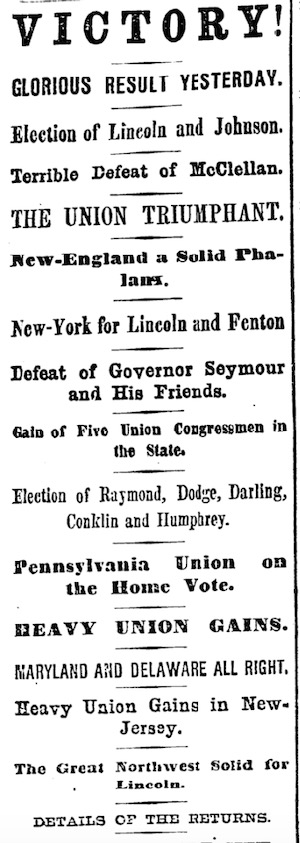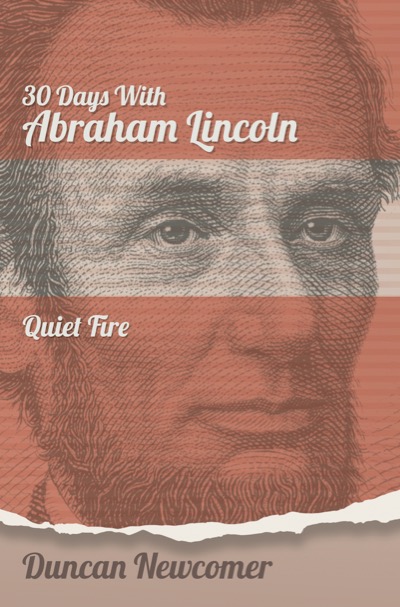
By DUNCAN NEWCOMER and DAVID CRUMM
In the ‘Quiet Fire’ series

From The New York Times front page on the day after the election of 1864.
This is Quiet Fire, a meditation on the spiritual life of Abraham Lincoln and its relevance to us today. Welcome.
Here’s a Lincoln quote for you: “The election was a necessity.” That’s part of what Abraham Lincoln said on November 10, 1864, two days after the astonishing completion of a national election in the midst of a Civil War.
Just completing the election was a miracle! Lincoln was as proud of that as he was that he had won a second term.
Lincoln would have been justified in crowing at his victory over this particular opponent. After all, he had defeated Gen. George McClellan who had said terrible, hateful things about Lincoln over the years. Despite McClellan’s behavior, Lincoln was not bitter. In fact, reporters for major newspapers who were waiting for Lincoln to finally humiliate his defeated foe admitted their surprise at the president’s refusal to gloat.
Instead, he said there should be a “statute of limitations” on political rivalries. And he added from his vast capacity for kindness, and familiarity with Shakespeare, that “so long as I have been here: I have not willingly planted a thorn in any man’s bosom.”
The clarity of Lincoln’s vision did not permit him to spend even a moment gazing at the fallen form of the vain and stubborn general who had been a thorn in his bosom for many years. He sincerely did not care about McClellan—because the greater lesson in the election of 1864 was larger than either candidate. The lesson of 1864 was that Americans could manage to hold an election in the middle of all-out war!
Of course, Lincoln was right in his assessment. Not many Americans, these days—aside from Civil War buffs—even remember McClellan.
The defeated bully didn’t matter much, even then, Lincoln realized. What mattered was the example of American democracy to the rest of the world.
As Lincoln reflected on the election in his brief public remarks on November 10, he stressed that the whole world had been watching as Americans passed through this seemingly impossible test of our democratic institutions.
As he addressed some of his supporters on that evening, Lincoln urged them to focus on that more enduring lesson. This election itself had been the real test, he said. “It has long been a grave question whether any government, not too strong for the liberties of its people, can be strong enough to maintain its own existence in great emergencies. On this point the present rebellion brought our republic to a severe test; and a presidential election occurring in regular course during the rebellion added not a little to the strain.”
Before the election, Lincoln himself had admitted his doubts about winning and, at the same time, committed himself to the election date without wavering. He had no choice, he said. If his vision of America was right and true—there was no other course than holding that election as planned and scheduled.
Here’s how he said it to his supporters on November 10: “The election was a necessity. We cannot have free government without elections; and if the rebellion could force us to forego—or postpone—a national election it might fairly claim to have already conquered and ruined us.”
The University of Virginia’s Miller Center is a national repository of scholarship for our political history. About that election, the Miller Center’s website tells visitors: “The amazing fact about the election of 1864 is that it occurred in the first place. In the middle of a devastating civil war, the United States held its presidential election almost without discussion about any alternatives. No other democratic nation had ever conducted a national election during times of war. And while there was some talk of postponing the election, it was never given serious consideration, even when Lincoln thought that he would lose.
“The second noteworthy fact about the election is that Lincoln won with a huge Electoral College victory and a substantial popular vote of 55 percent. Up to the very eve of the election, Lincoln was doubtful about his chances, and most of his key advisers had been warning him through the summer of 1864 to expect the worst.”
Lincoln did not waver. He knew he could not waver. That’s the lesson of November 1864. Lincoln’s faith in America defined his path toward an election day he thought might very well end in his defeat. As much as he wanted to prevail for a second term—and as much as he feared the looming election—he could not consider anything but to proceed to election day.
On November 10, relieved by what had happened on election day, he ended his remarks this way: “The election, along with its incidental, and undesirable strife, has done good too. It has demonstrated that a people’s government can sustain a national election, in the midst of a great civil war. Until now it has not been known to the world that this was a possibility.”
May Lincoln’s clarity of vision continue to light us down in honor to the latest generation—and the latest election.
This is Duncan Newcomer, and this has been Quiet Fire, the spiritual life of Abraham Lincoln.
ReadTheSpirit Editor David Crumm collaborated with Duncan on this week’s column.
.
Care to Enjoy More Lincoln Right Now?
GET A COPY of Duncan’s 30 Days with Abraham Lincoln—Quiet Fire.
Each of the 30 stories in this book includes a link to listen to the original radio broadcasts. The book is available from Amazon in hardcover, paperback and Kindle versions. ALSO, you can order hardcover and paperback from Barnes & Noble. In addition, our own publishing house offers these bookstore links to order hardcovers as well as paperbacks directly from our supplier.
.
- Duncan Newcomer’s Abraham Lincoln Quiet Fire 4: The courage to say—’In spite of all this, I will be!’
- Duncan Newcomer’s Abraham Lincoln Quiet Fire 1: In this cruel month of death, what will be our legacy?
- Duncan Newcomer’s Abraham Lincoln Quiet Fire 2: Coping with the Uncertainty and Mystery of a Deadly Disease
- Duncan Newcomer’s Abraham Lincoln Quiet Fire 3: We Must Rise with the Occasion
- Duncan Newcomer’s Abraham Lincoln: When will we be good? God knows!
- Duncan Newcomer’s Abraham Lincoln Quiet Fire 6: Lincoln’s Courage to Judge and to Lament
- Duncan Newcomer’s Abraham Lincoln Quiet Fire 7: Lincoln looks toward his spiritual hero, Washington
- Duncan Newcomer’s Abraham Lincoln Quiet Fire 8: Four Score and Seven
- Duncan Newcomer’s Abraham Lincoln Quiet Fire 9: A Unique Spiritual Quest and The Pilgrim’s Progress
- Duncan Newcomer’s Abraham Lincoln Quiet Fire 10—When all three meet: Lincoln, black people and the Bible.
- Duncan Newcomer’s Abraham Lincoln Quiet Fire 11—Raising a Flag and Contemplating the Sacred Pillars of America
- Duncan Newcomer’s Abraham Lincoln Quiet Fire 12—Why do we refer to our most eloquent president as ‘Quiet’?
- Duncan Newcomer’s Abraham Lincoln Quiet Fire 13—Ultimately, we are responsible for our faces.
- In Our Struggle for Freedom, the Truth is Not in Our Statues—It’s in Our Souls
- Duncan Newcomer’s Abraham Lincoln Quiet Fire 16—In racial justice, ‘We … bear the responsibility.’
- Duncan Newcomer’s Abraham Lincoln Quiet Fire 17—Remembering Mrs. Keckley, a close friend who Lincoln realized he did not truly know
- Duncan Newcomer’s Abraham Lincoln: Remember when a president’s 1st value was Kindness?
- Abraham Lincoln Quiet Fire 19—’The election was a necessity’
- Duncan Newcomer’s Abraham Lincoln Quiet Fire 20—’A Most Sacred Right’
- Duncan Newcomer’s Abraham Lincoln Quiet Fire 21—Locating the spiritual X-factor in Lincoln’s ground-breaking life
- Duncan Newcomer’s Abraham Lincoln Quiet Fire 22—Lincoln shows us the power of holding even opposites together
- Duncan Newcomer’s Abraham Lincoln Quiet Fire 23—The forest vision Lincoln shared with poet Rabindranath Tagore
- Duncan Newcomer’s Abraham Lincoln Quiet Fire 24—Myths and wisdom in national conversation about rule of law
- Duncan Newcomer’s Abraham Lincoln Quiet Fire 25—How a true leader expresses the nation’s grief
- Duncan Newcomer’s Abraham Lincoln Quiet Fire 26—Choosing Humility over Humiliation
- Duncan Newcomer’s Abraham Lincoln Quiet Fire 27—What shaped Lincoln’s soul?
- Duncan Newcomer’s Abraham Lincoln Quiet Fire—Here’s to you Mrs. Robinson!
- Duncan Newcomer’s Abraham Lincoln Quiet Fire—Now, we’re all hoping for ‘Yonder’
- Duncan Newcomer’s Abraham Lincoln Quiet Fire—In three words, he said it: ‘We are elected.’
- Duncan Newcomer’s Abraham Lincoln Quiet Fire—Let’s remember how he reached across the aisle to discover new friends
- Duncan Newcomer’s Abraham Lincoln Quiet Fire—Marking the anniversary of those 272 words at Gettysburg
- Duncan Newcomer’s Abraham Lincoln Quiet Fire—’The Last Best Hope of Earth’
- Duncan Newcomer’s Abraham Lincoln Quiet Fire—’A Christmas Carol’ with Abraham Lincoln


Wise comments — and timely today, as so much of Lincoln’s story is. In my book on King David (to follow Duncan’s in this “30 Days with …” series), King David exhibits the same magnanimity toward his former foes and gives higher priority to looking ahead than gloating or looking back. (See 2 Samuel 5:1-5.) Lincoln’s determination in the face of his anticipated loss is amazingly admirable. Thank you, Duncan.
My friend Duncan knows what to write and when to write it. I was impressed fifty years ago, and more so today. Enough said. Thank you, Duncan